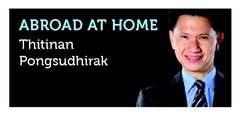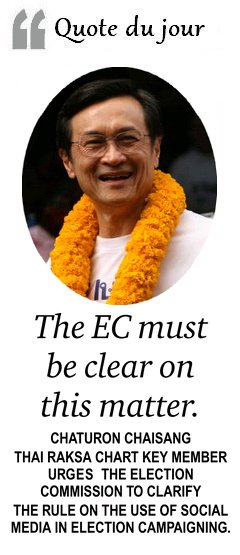
Thailand is supposed to have an independent Election Commission (EC) that oversees all electoral contests from local polls to national referendums. But as Thailand heads towards a general election on March 24, the seven-member EC has appeared less than eager and enthusiastic and too beholden to government preferences in staging what will be Thailand's first election in nearly nine years.
For the upcoming poll to lead Thailand in the right direction towards popular rule and representative government, the EC must function and act independently as mandated. If the EC were to become more politicised and slip further under the military government's spell, it will likely create more questions and problems than ways forward for the country.

Thitinan Pongsudhirak teaches International Relations and directs the Institute of Security and International Studies at Chulalongkorn University.
Even though the EC is operational, the military government under Gen Prayut Chan-o-cha (retired) seems to be calling all the shots that matter. The election date is the most glaring of all. After repeated delays from 2015, it appeared Feb 24 this year would be the date. It was premised on a statement reportedly made by the National Council for Peace and Order during its meeting with some political parties early last month. But the EC had not set an official poll date given that it could only do so after a royal decree calling for a general election is issued by the government.
Even though setting the poll date is the official EC job, the Prayut government has been in full manipulative control of the election timing. At issue is the issuance of the Royal Decree to set the electoral process in motion. The election-enabling decree was launched on Jan 23 but how long the Prayut government been idling and dithering with it is a matter of opacity. For days prior to its promulgation, some Thailand watchers naturally wondered if a Royal Decree was in the offing. Now it appears clear that the decree has been with the government, and the days of delay from Feb 24 are likely to be attributable to Gen Prayut's administration.

In a hesitant fashion, the EC did hint at March 10 as the election date. But somehow Deputy Prime Minister Wissanu Krea-ngam had the last word on behalf of the military government, insisting that March 24 is best. This is a crucial point to note. Among the five Sundays this March, the EC suggested March 10 but the government got its way with March 24. Had the EC stuck with March 10, public sentiment would have likely rallied around it, as the electorate is desperate for an election as a way of getting rid of the current military regime. But once the EC wavered, the government took over the election timing.
The EC's apparent subordination is unsurprising because all of its commissioners were nominated and chosen under junta rule. Insubordination can come with a high price. For example, a former EC commissioner, Somchai Srisutthiyakorn, was removed by Gen Prayut's draconian, absolutist Section 44 for asserting his functional independence instead of kowtowing to the government.
In the same vein, the current EC seems more lenient and understanding when it comes to allegations of electoral wrongdoings and improprieties involving the pro-military, pro-Prayut Palang Pracharath Party, compared to other parties. Thus Palang Pracharath continues to be led by four sitting cabinet members, and the military government has been disbursing government largess to rural constituencies as populist schemes to build upcountry support.
Gen Prayut has feigned unawareness that Palang Pracharath is effectively the military party which wants him to spearhead it. The government continues to rule and run the country even though it should be in caretaker mode in view of its seizure of power more than four years ago and its ongoing intent to contest and win the upcoming poll.
The EC has been muted and timid in the face of these conflicts of interest where member of the military government have formed a pro-military party that is using the Thai people's taxes to win hearts and minds so that the junta chief can be post-election prime minister. It is so blatant and yet the EC looks in other directions.
The EC's uneven supervision so far raises the spectre of a poll which is not just unfair, but also not free. That it will be unfair is a foregone conclusion long ago in view of the pro-military constitution drafted by a junta-appointed committee. But now the military's potentially manipulative and coercive role during the electoral process is suspect. In recent weeks, soldiers have reportedly been deployed to propagate government views and support pro-military candidates. The military will not be a neutral observer at election time; it will be on the side of Palang Pracharath and its allies against other civilian-led, anti-junta parties.
The growing likelihood that the military will try to sway election outcomes provides justification for the EC to invite accredited foreign election monitors. This issue is directly within the EC's jurisdiction, notwithstanding Foreign Minister Don Pramudwinai's initial knee-jerk rejection of outside observers.
Thailand's road towards the poll is unlikely to be smooth. The EC is now front and centre in what happens next. It is tasked with announcing final results by May 9, including the adjudicating electoral fraud and by-elections to come up with 95% of final MP winners by the deadline. With high stakes, including the potential for a nullified election or delayed results in violation of the charter, the EC should be smart and start siding with the electorate. It needs to be "populist" and assert its independence in an even-handed, fair-minded fashion, not just for the well-being of its commissioners but also for Thailand's incremental step forward.

